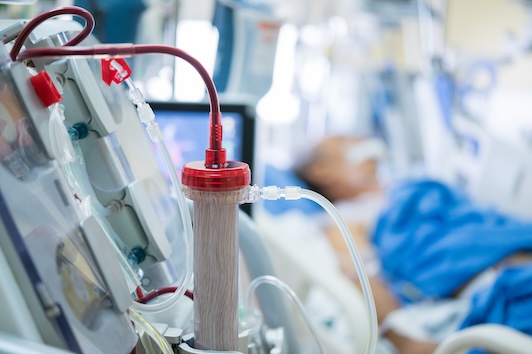An international study led by researchers from Lawson Health Research Institute at London Health Sciences Centre (LHSC) and published in JAMA finds there is no difference in a number of health indicators in kidney donors when compared to individuals with similar levels of baseline good health seven years after donation.
The study included 1,042 living kidney donors and 396 non-donors at 17 transplant centres across Canada and Australia. Participants were recruited between 2004 and 2014 and followed for an average of seven years. Donors completed health questionnaires and basic health tests before kidney donation, three months after donation, and then annually until 2021.
“Donating a kidney has widely been considered safe in carefully selected candidates, acknowledging some inherent risks,” says Dr. Amit Garg, Scientist at Lawson and Nephrologist at LHSC. “While some smaller prior studies suggested a risk of high blood pressure, our team conducted a large international study that has found no difference in blood pressure nor long-term quality of life between living kidney donors and other healthy individuals.”
The study found very few differences between the two groups during study follow-up:
- The rate of hypertension and change in average blood pressure was the same in both groups.
- After an initial drop in donors’ eGFR (a blood test that measures kidney function), the rate of kidney function did not decline more in donors than non-donors. There was also no difference between groups in another measure of kidney health – the amount of protein in the urine.
- Aside from three months post-surgery, when physical health summary scores were significantly lower in donors, there were no differences between the two groups in subsequent health summaries, including self-reported physical function, mental function, anxiety or depression.
“This study is significant as its findings suggest that a kidney donation will not increase blood pressure in the first seven years after donation,” says Dr. Garg, who is also a Professor of Medicine, Epidemiology and Biostatistics at Western University’s Schulich School of Medicine & Dentistry.
Bob McRae became a participant in the study after donating a kidney anonymously nearly 15 years ago through the national Living Donor Paired Exchange Registry.
“I wanted to participate in the study to help contribute to evidence about the long-term safety of living kidney donation,” says McRae. “I hope the results will encourage more people to consider becoming a living kidney donor.”
The study also provides insights into how long it takes to recover from living kidney donation. While current pre-donation materials suggest donors return to full function four to six weeks after surgery, the study suggests that over 12 weeks might be a more accurate timeline for recovery.
The research team continues to analyze the study data to examine outcomes for non-standard donors, psychosocial impacts on anonymous donors, the presence of genetic kidney disease in donors, and more.
“We are starting to develop a clearer picture of whether donor risks are attributable to the surgery; hereditary factors since donors are more likely than non-donors to have a family history of kidney failure and hypertension; or are simply found due to more follow-up assessments in donors than non-donors,” says Dr. Garg. “This research will provide better evidence on living kidney donor outcomes to guide patient and provider decision-making. Guideline-recommended follow-up testing and care to maintain good long-term donor health remains essential.”
Lawson Health Research Institute: Lawson Health Research Institute is one of Canada’s top hospital-based research institutes, tackling the most pressing challenges in health care. As the research institute of London Health Sciences Centre and St. Joseph’s Health Care London, our innovation happens where care is delivered. Lawson research teams are at the leading-edge of science with the goal of improving health and the delivery of care for patients. Working in partnership with Western University, our researchers are encouraged to pursue their curiosity, collaborate often and share their discoveries widely. Research conducted through Lawson makes a difference in the lives of patients, families and communities around the world. To learn more, visit www.lawsonresearch.ca.




